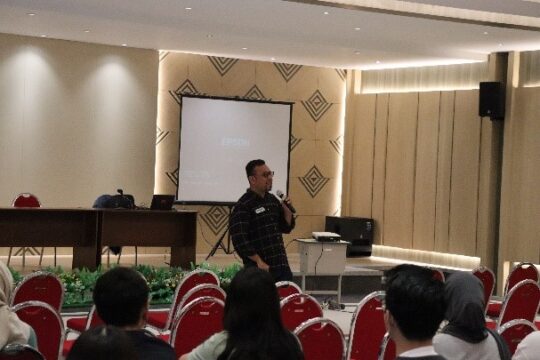The students’ laughter echoed in the Hall of Building A at the Faculty of Cultural Studies (FCS) Universitas Brawijaya (UB). Dewantoro Ratri, M.Hum., Chairperson of the Association of Indonesian Translators (HPI) East Java Region and Founder of MainKata Translation Studio, was invited by FCS UB for the Praktisi Mengajar programme. His witty delivery successfully captivated the students, sparking their interest in learning more about the intricacies of being a translator and interpreter. The event was held on Monday (27/5/2024).
Dewantoro began the session by introducing the potential of these two professions in the language field. He shared his own experiences and those of his colleagues who have built successful careers in translation and interpretation.
He then delved deeper into the practical aspects. Starting with checking emails containing briefs and requests from clients, Dewantoro emphasised that translators and interpreters should always pay close attention to details and double-check the profiles of potential clients. He also introduced ProZ, a website where translators and interpreters can connect with service users. Here, students could see various types of projects, ranging from simple to complex.
“I have shown you the potential of being a translator and interpreter. These professions offer promising career paths. The next question is, do you have what it takes to be a professional translator and interpreter?” said Dewantoro.
Without further ado, Dewantoro invited the students to practice translation and interpretation work. He guided them through a Zoom Meeting session, giving them sentences to translate. Dozens of responses appeared in the chat.
“The value of translation lies in its accuracy, including punctuation. Therefore, punctuation is crucial. Additionally, words or phrases that differ in context from their literal translation demonstrate the necessity of translation and language transfer work,” Dewantoro explained while reviewing the students’ answers.
“In interpreting, verbal language is not always grammatically correct. Computers can’t always capture the meaning and translate it accurately. But linguists can understand the context behind what humans say,” he added.
Some students successfully translated the sentences correctly and were rewarded with gifts from Dewantoro.
In addition to translation practice, Dewantoro also invited students to try interpreting. He taught the students the processes involved in interpreting and utilised the Zoom Meeting interpreter feature for practice.
“Interpreting is not easy at all. We have to think quickly and adjust the rhythm of our speech to match the speaker. It requires special skills and is quite challenging for those not used to it,” said Ami, one of the students who attempted interpreting.
Dewantoro also demonstrated how a professional interpreter performs his job, further enriching the students’ understanding.
A question-and-answer session followed. Several students asked questions in turn. An important question came from Rifqi Fauzan.
“I think we, as English Literature students, haven’t been exposed to enough information about this. I want to know, what is the entry point to become a translator? What needs to be prepared? For example, what certifications are necessary to assure clients of our responsibility for this job? Is it better to be a freelancer or join an agency?” Rifqi asked.
To answer these questions, Dewantoro recommended joining the Indonesian Translators Association (HPI) as an entry point. HPI’s National Certification Test (TSN) is an option for certification to become a professional translator.
He also mentioned several international certifications, including those from Australia’s National Accreditation Authority for Translators and Interpreters (NAATI) and the American Translators Association (ATA). He suggested that beginners join an agency to learn how professional translators and interpreters work.
The sharing session concluded with Dewantoro thanking everyone who attended and contributed to the success of the programme. [trans.acl/ed.vidya/PR FCS]




